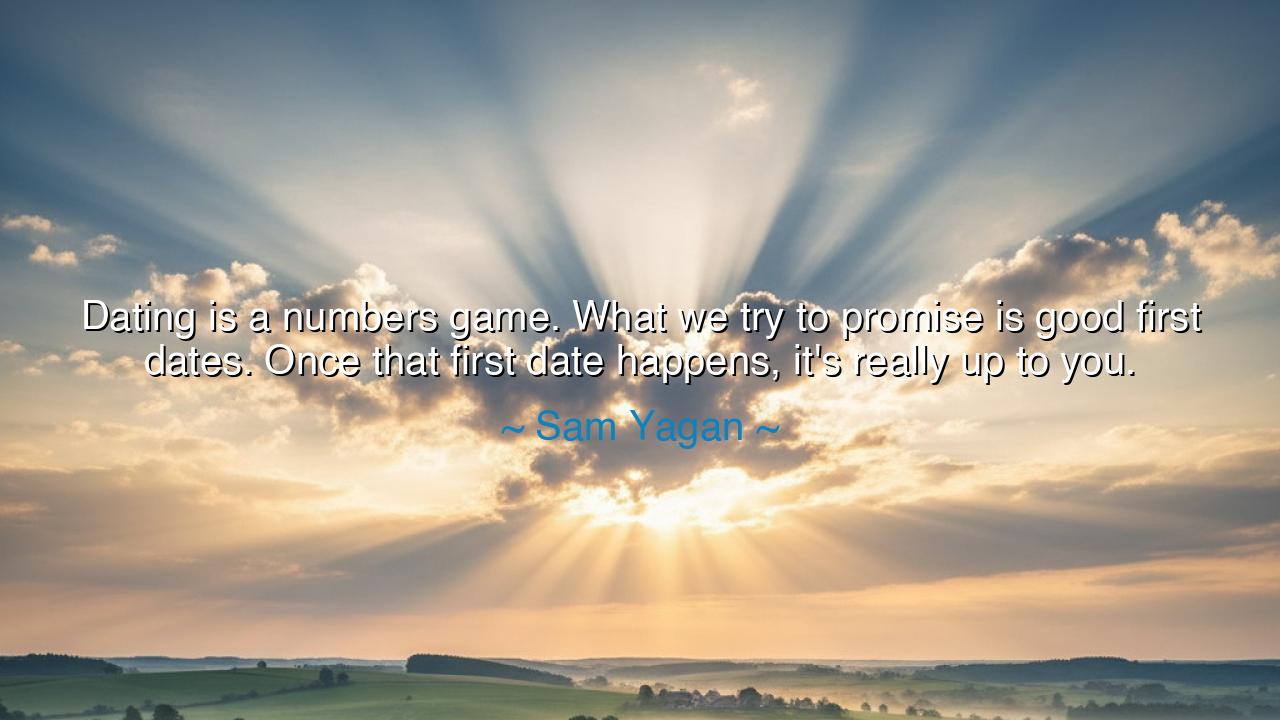
Dating is a numbers game. What we try to promise is good first
Dating is a numbers game. What we try to promise is good first dates. Once that first date happens, it's really up to you.






In the marketplace of the heart, a clear, almost merchant’s creed is spoken: “Dating is a numbers game. What we try to promise is good first dates. Once that first date happens, it’s really up to you.” Beneath its modern candor lies an old law of human meeting: fortune favors those who show up often and well, and then, at the appointed hour, fortune withdraws her hand so character may take the stage. Probability opens the door; presence and virtue cross the threshold.
The first clause—“Dating is a numbers game”—names the arithmetic of encounter. In any city or village, only some will share your humor, your pace, your hopes for the years. The elders knew this without algorithms: they made feasts, fairs, and dances not merely for revelry but to increase the count of meaningful crossings. To widen the field is not to cheapen love; it is to honor its rarity by giving it many chances to appear. One cannot reap where one has not sown; one cannot be chosen where one has not arrived.
The second clause—“What we promise is good first dates”—draws a sacred boundary around the work of matchmakers, friends, and tools. They can offer a clean room, a kind introduction, a table where conversation might grow roots. But a good first date is scaffolding, not cathedral. It is the well-swept threshold, the lamp lit at dusk. It removes needless friction so that the real test—two human beings, breathing the same hour—can proceed without fog.
Then comes the hinge of wisdom: “Once that first date happens, it’s really up to you.” Here the counting gives way to keeping. No platform can lend you listening; no host can supply courage; no clever profile can stand in for the small, luminous discipline of attending to another person without performance. This is the ancient passage from chance to choice, from luck to craft. A thousand doors may open; only you can walk in with truth, gentleness, humor, and steadiness enough to be remembered tomorrow.
Consider a tale from the assembly rooms of Georgian Bath. There, beneath chandeliers and the rustle of silk, dozens met in an evening—music multiplied the numbers game. Yet it was not the multitude that made a marriage, but the way two partners handled a single set: the respect in a bow, the patience in a misstep, the ease with which conversation turned from weather to conviction. Many danced; a few connected; fewer still returned with letters that ripened into vows. The crowd offered opportunity; the pair supplied character.
This proverb also protects the heart against two opposing errors. The first is fatalism: to treat love as pure math and forget the moral labor of honesty, boundaries, and repair. The second is romantic superstition: to wait for destiny at home while the garden of chance goes untilled. Wisdom stands between: enlarge your circle with intention, then bring your best self to the meeting. Let scale serve sincerity, not replace it.
Take these rites for the road. (1) Serve the numbers game: show up—join communities, accept invitations, schedule modest, frequent encounters rather than rare grand gestures. (2) Prepare for good first dates: rest, arrive on time, ask questions that reveal values, not just tastes; choose places where both can be at ease. (3) Honor the up to you: listen more than you speak, name your boundaries without drama, and close the evening with a clear, kind next step—either a “no, thank you” or a “yes, let’s meet again.” (4) After each meeting, refine—not your mask, but your manners and your aim. Do this, and chance will have many doors to knock on, and when it does, you will be ready to answer with a life worthy of being chosen.






AAdministratorAdministrator
Welcome, honored guests. Please leave a comment, we will respond soon